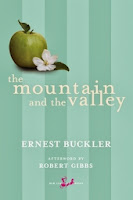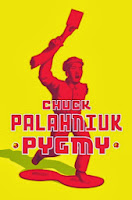 There are a lot of reasons that a classic book can be a struggle,
but two of the most common reasons in my opinion are being forced to read
something (especially if you are not mature enough for it) and having a poor
teacher. My
bad experience with Can Lit was Ernest Buckler’s The Mountain and the Valley (M).
There are a lot of reasons that a classic book can be a struggle,
but two of the most common reasons in my opinion are being forced to read
something (especially if you are not mature enough for it) and having a poor
teacher. My
bad experience with Can Lit was Ernest Buckler’s The Mountain and the Valley (M).Similarly, a wonderful teacher can turn things around. I must give my high school teacher, Ms. McNutt, credit for that.
Sometimes it is the era the book was written in and that the language is hard to understand, like much of James Joyce and William Shakespeare, The Faerie Queene by Spenser, The CanterburyTales by Chaucer, etc...
Here are some of the personal tough reads mentioned by library staff:
 Moby Dick (M) by
Herman Melville is one of those books that you are forced to read for
school. Maybe that is why so many resist
it. Or maybe there is only so much you
can take of reading about whaling techniques and crazy, obsessed men. Mind you I think school has ruined a lot of
books and authors. Mind you I did have one of my fellow workers
stating that they loved the novel.
Moby Dick (M) by
Herman Melville is one of those books that you are forced to read for
school. Maybe that is why so many resist
it. Or maybe there is only so much you
can take of reading about whaling techniques and crazy, obsessed men. Mind you I think school has ruined a lot of
books and authors. Mind you I did have one of my fellow workers
stating that they loved the novel.
Most people list War and Peace (M) by Leo Tolstoy as their Mount Everest of reading. This novel is so long and so “foreign” both in language, place and time period that it actually has become a joke that this is the year it will be read.
 Pygmy (M) by Chuck
Palahniuk is my challenge book. While I
read all his other novels this is one that I just cannot get through. The language is so stilted and he uses twenty
words when three might suffice. I know
that the language in the book is part of the whole premise but it eluded me.
Pygmy (M) by Chuck
Palahniuk is my challenge book. While I
read all his other novels this is one that I just cannot get through. The language is so stilted and he uses twenty
words when three might suffice. I know
that the language in the book is part of the whole premise but it eluded me. House of Leaves (M) by
Daniel Z. Danielewski. This is one
confusing book. It is not even straightforward
on how to read it. It is not that it
reads from the back; like manga. It reads from the front, the side, it
circles, etc. I wanted very much to read
it but it took way too much effort.
House of Leaves (M) by
Daniel Z. Danielewski. This is one
confusing book. It is not even straightforward
on how to read it. It is not that it
reads from the back; like manga. It reads from the front, the side, it
circles, etc. I wanted very much to read
it but it took way too much effort.
Infinite Jest (M) by
David Foster Wallace – I know that this is supposed to be one of the best books
ever, but I just cannot get into it.

Blood Meridian (M) by Cormac McCarthy. Like all of McCarthy’s materials, this is one that has a beautiful way with words but you have to have a strong heart and stomach to read this nonstop nihilistic rampage of bloody scalps and other violence.
 Trainspotting (M) by
Irvine Welsh is a movie that I have seen but have never read. It takes a stronger stomach than mine to read. In 1993 it was long listed for the Booker
Prize but was barred from the shortlist after it offended the sensibilities of
two of the judges. Of course Welsh was
not content to sit by to this. He
launched an attack calling the Booker a “highly imperialist-oriented” literary
award and that they failed to deal with a problem of “anti-Scottishness”. Julian Barnes has also called the Booker
Prize selection “posh bingo”.
Trainspotting (M) by
Irvine Welsh is a movie that I have seen but have never read. It takes a stronger stomach than mine to read. In 1993 it was long listed for the Booker
Prize but was barred from the shortlist after it offended the sensibilities of
two of the judges. Of course Welsh was
not content to sit by to this. He
launched an attack calling the Booker a “highly imperialist-oriented” literary
award and that they failed to deal with a problem of “anti-Scottishness”. Julian Barnes has also called the Booker
Prize selection “posh bingo”.  The Sound and the Fury
(M) by William Faulkner is a classic but is also confusing steam of consciousness narration
that keeps changing place, time and narrators on you. Even Faulkner must have felt so because he
had originally intended to use different coloured inks to signify different
temporal spaces.
The Sound and the Fury
(M) by William Faulkner is a classic but is also confusing steam of consciousness narration
that keeps changing place, time and narrators on you. Even Faulkner must have felt so because he
had originally intended to use different coloured inks to signify different
temporal spaces.So, Dear Reader, put on your “hiking” gear and go climb some book mountains!







No comments:
Post a Comment